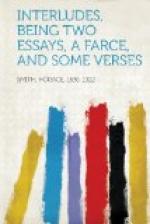There was, once upon a time, a very strong Court of Appeal. It was universally acknowledged to be so, and the memory of it still remains, and very old lawyers still love to recall its glories. It was composed of Lord Chancellor Campbell and the Lords Justices Knight-Bruce and Turner. Bethell (afterwards Lord Westbury) was an ambitious and aspiring man, and was always most caustic in his criticisms. He had been arguing before the above Court one day, and upon his turning round after finishing his argument, some counsel in the row behind him asked, “Well, Bethell, how will their judgment go?” Bethell replied, in his softest but most cutting tones, “I do not know. Knight-Bruce is a jack-pudding. Turner is an old woman. And no human being can by any possibility predict what will fall from the lips of that inexpressibly fatuous individual who sits in the middle.” This is funny, but it is vulgar, and it is not given in good faith. It is the offspring of anger and spite mixed with a desire to be clever and antithetical.
I gather from Mr. Matthew Arnold’s essays on criticism that the endeavour of the critic should be to see the object criticized “as in itself it really is,” or as in another passage he says, “Real criticism obeys an instinct prompting it to know the best that is known and thought in the world.” “In order to do or to be this, criticism,” he says, in italics, “ought to be disinterested.” He points out how much English criticism is not disinterested. He says, “We have the Edinburgh Review, existing as an organ of the old Whigs, and for as much play of mind as may suit its being that; we have the Quarterly Review, existing as an organ of the Tories, and for as much play of mind as may suit its being that; we have the British Quarterly Review, existing as an organ of the political Dissenters, and for as much play of mind as may suit its being that; we have the Times existing as an organ of the common satisfied well-to-do Englishman, and for as much play of mind as may suit its being that. . . . Directly this play of mind wants to have more scope, and to forget the pressure of practical considerations a little, it is checked, it is made to feel the chain. We saw this the other day in the extinction so much to be regretted of the Home and Foreign Review; perhaps in no organ of criticism was there so much knowledge, so much play of mind; but these could not save it.




